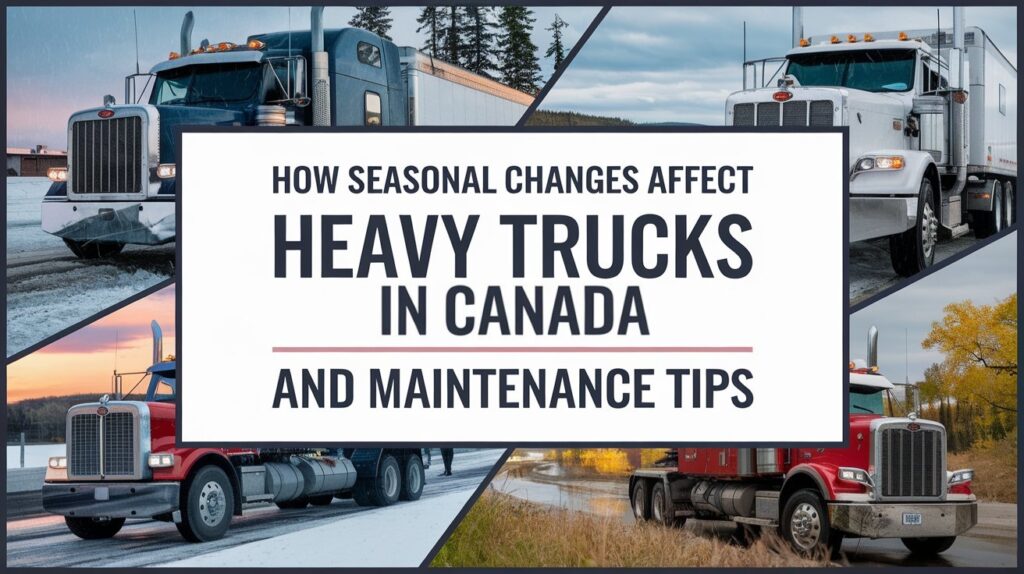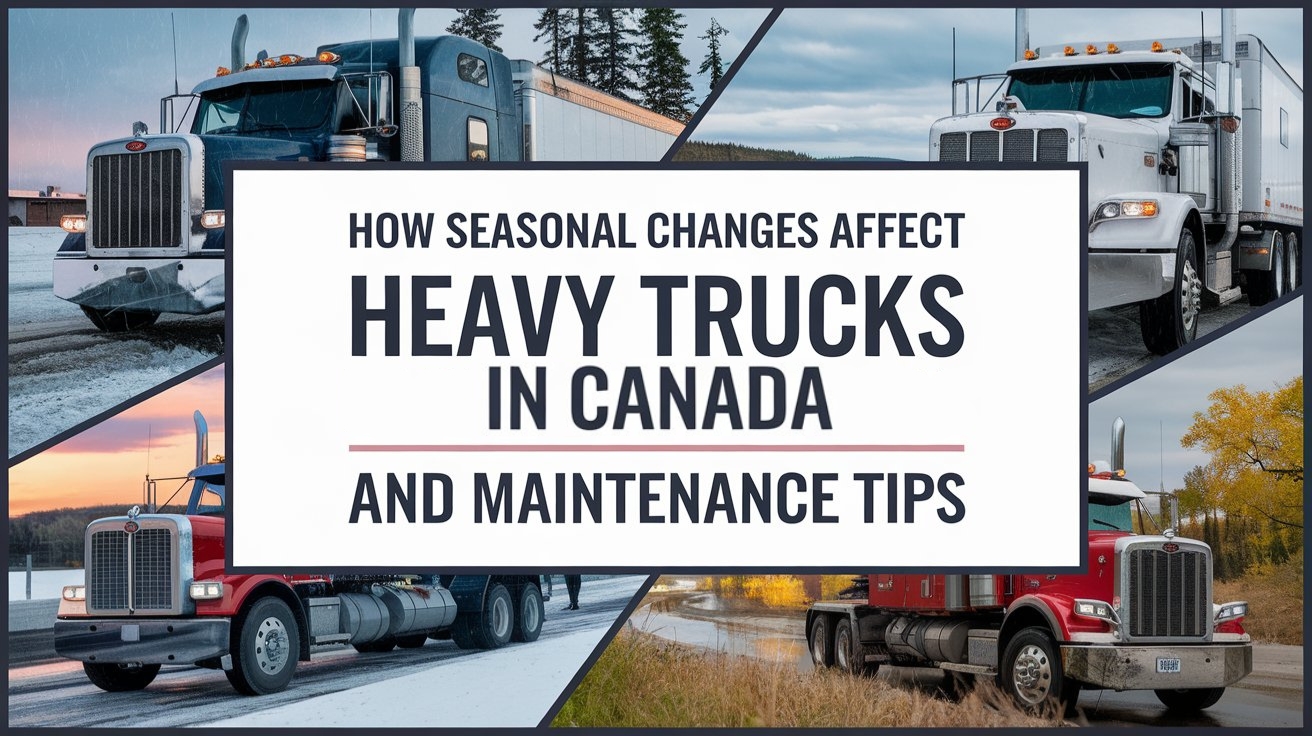Seasonal changes in Canada bring unique challenges for heavy trucks. From icy roads in winter to summer heatwaves, each season demands specific preparation and maintenance to keep heavy trucks running efficiently and safely. In this blog, we explore how seasonal changes affect heavy trucks and provide essential seasonal maintenance for heavy trucks tips to tackle these challenges effectively.
Why Seasonal Maintenance for Heavy Trucks is Crucial
Heavy trucks are the backbone of Canada’s transportation industry. However, seasonal variations in weather can significantly impact their performance, durability, and safety. Proper seasonal maintenance for heavy trucks not only ensures smooth operations but also reduces downtime, enhances fuel efficiency, and prolongs the truck’s lifespan.
How Seasonal Changes Affect Heavy Trucks
1. Winter Challenges
Canadian winters are notorious for extreme cold, snow, and ice. Heavy trucks face the following challenges:
- Battery Issues: Cold temperatures reduce battery efficiency, making it harder to start the engine.
- Brake Performance: Ice and snow can affect brake performance and traction.
- Tire Wear: Improper tire pressure due to cold weather increases the risk of blowouts.
- Fuel Gelation: Diesel fuel tends to gel in sub-zero temperatures, leading to fuel line blockages.
2. Spring Thaw Complications
As temperatures rise in spring, heavy trucks encounter unique problems:
- Flooded Roads: Melting snow can cause waterlogging, leading to road instability and potential damage to truck suspensions.
- Rust Formation: Moisture accumulation can accelerate rust on undercarriages and other metal parts.
- Mud and Dirt: Spring mud can clog filters and reduce overall performance.
3. Summer Heat Strain
Summer brings intense heat, which can strain various truck components:
- Engine Overheating: High temperatures increase the risk of engine overheating, especially during long hauls.
- Tire Blowouts: Heat causes tire pressure to rise, increasing the likelihood of blowouts.
- AC System Overload: Frequent use of air conditioning can strain the truck’s electrical system.
4. Autumn Hazards
Autumn’s unpredictable weather can create:
- Slippery Roads: Wet leaves and early frosts reduce traction.
- Visibility Issues: Fog and shorter daylight hours can impair visibility.
- Debris Damage: Falling leaves and twigs can clog vents and filters.
Seasonal Maintenance for Heavy Trucks Tips
Winter Maintenance Tips
- Inspect Batteries: Ensure batteries are fully charged and in good condition. Replace old batteries to avoid starting issues.
- Use Winter Tires: Equip your truck with winter-grade tires for improved traction on icy roads.
- Check Antifreeze Levels: Maintain the correct antifreeze concentration to prevent engine freezing.
- Keep Fuel Tanks Full: A full tank reduces condensation and prevents fuel line freezing.
- Lubricate Moving Parts: Cold weather can stiffen joints and seals, so ensure proper lubrication.
Spring Maintenance Tips
- Clean the Undercarriage: Wash off accumulated salt and debris to prevent rust.
- Inspect Suspension: Check for damage caused by potholes and uneven roads.
- Replace Filters: Replace air and oil filters clogged with mud and dirt.
- Check Tires: Ensure proper tread depth and inflate tires to the recommended pressure.
- Inspect Brakes: Address any wear and tear caused during winter.
Summer Maintenance Tips
- Monitor Tire Pressure: Regularly check tire pressure to avoid blowouts caused by heat.
- Service the Cooling System: Flush and refill the cooling system to prevent engine overheating.
- Inspect the AC System: Ensure the air conditioning is functioning efficiently.
- Check Fluids: Top up fluids, including engine oil and transmission fluid, to optimal levels.
- Protect Against UV Rays: Use UV-protective covers for sensitive parts to prevent sun damage.
Autumn Maintenance Tips
- Inspect Windshield Wipers: Replace wipers to ensure clear visibility during rain or fog.
- Clean Vents and Filters: Remove debris such as leaves to prevent clogging.
- Check Lighting Systems: Ensure headlights, brake lights, and fog lights are working properly.
- Inspect Tires for Traction: Check tread depth and replace worn-out tires.
- Prepare for Early Frost: Start using antifreeze windshield washer fluid to prevent freezing.
Seasonal Maintenance for Heavy Trucks Checklist
- Engine Oil and Filters: Check and replace as needed.
- Brake System: Regularly inspect for wear and tear.
- Battery Health: Ensure optimal performance with seasonal checks.
- Tire Condition: Maintain correct pressure and tread depth.
- Fluid Levels: Top up coolant, antifreeze, and transmission fluids.
- Electrical Systems: Test lights, signals, and the AC system.
- Body and Undercarriage: Inspect for rust and damage.
Benefits of Seasonal Maintenance for Heavy Trucks
- Enhanced Safety: Reduces the risk of accidents caused by mechanical failures.
- Improved Fuel Efficiency: Optimizes truck performance.
- Prolonged Lifespan: Minimizes wear and tear.
- Reduced Downtime: Prevents unexpected breakdowns.
- Cost Savings: Lowers repair and replacement costs.
FAQs About Seasonal Maintenance for Heavy Trucks
1. How does cold weather affect heavy truck batteries?
Cold temperatures reduce the chemical reaction in batteries, lowering their efficiency. It’s important to check battery health regularly during winter.
2. What is the best way to prevent rust on heavy trucks?
Regularly clean the undercarriage, especially after winter, and apply anti-rust treatments to protect metal parts.
3. How often should I check tire pressure in summer?
Tire pressure should be checked at least once a week during summer, as heat can cause pressure fluctuations.
4. Can I use the same antifreeze all year round?
Yes, but ensure it is rated for the temperature extremes in your region to provide adequate protection in all seasons.
5. What should I do if my truck’s AC stops working during summer?
Inspect the refrigerant levels and belts. If the issue persists, have the AC system checked by a professional.
By following these tips and maintaining a seasonal maintenance for heavy trucks checklist, heavy truck owners can ensure their vehicles operate smoothly throughout the year, regardless of Canada’s challenging weather conditions. Proactive maintenance is the key to long-lasting performance and safety.
Contact JSS Truck Repairs Inc for Expert Assistance
At JSS Truck Repairs Inc, we understand the importance of keeping your heavy trucks in top condition throughout the year. Our experienced team provides comprehensive maintenance and repair services tailored to tackle the challenges posed by Canada’s seasonal changes. From winter-proofing your truck to summer cooling system checks, we’ve got you covered.
Get in touch with us today to schedule your seasonal maintenance or for any heavy truck repair needs. Let us help you keep your fleet running smoothly and efficiently in every season!








